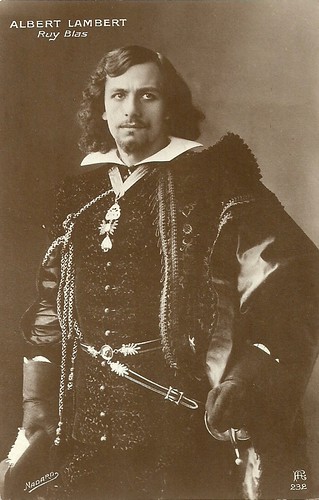
French postcard. Photo: Nadar, no. 232. The photo dates from the 1880s, but the card may be newer.

French postcard by A.B., Paris. Albert Lambert in 'Bajazet'.
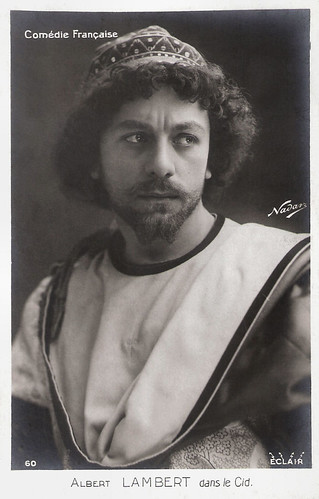
French postcard by Eclair, no. 60. Photo: Nadar. Publicity still for the Comédie Française stage production of 'Le Cid' (1906) by Pierre Corneille.
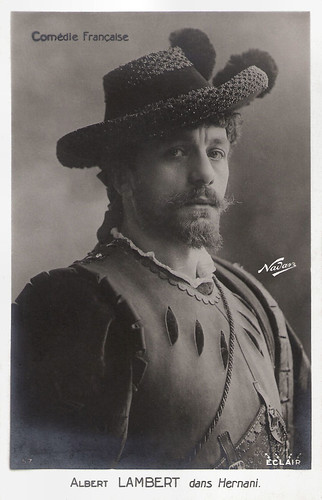
French postcard by Eclair, no. 57. Photo: Nadar. Publicity still for the Comédie Française stage production of 'Hernani' (1920?) by Victor Hugo.
The respectable Film d'Art
Albert-Raphaël Lambert was born in Rouen in 1865 as son of the actor and sculptor Albert Lambert. Junior did the Conservatoire national, where in 1883 he obtained a first award in tragedy. Lambert’s father for a long time was Pensionnaire at the Théâtre de l'Odéon in Paris. In the 1880s Lambert fils already acted at the Théâtre de l'Odéon in plays by e.g. François Coppée, Alphonse Daudet and William Shakespeare before entering the reputed Comédie-Française in 1885 with his part in 'Ruy Blas' by Victor Hugo.
Lambert became sociétaire of the Comédie-Française in 1891, where he remained till 1935. At the famous stage company, his roles of Antioch (1893) in 'Bérénice' by Jean Racine and Didier (1905) in 'Marion Delorme' by Victor Hugo became so popular, that he repeated them in later years (resp. 1906 and 1922). While Lambert acted in many plays by Hugo, he also was a regular in plays by Shakespeare, Sophocles and Racine.
In 1930 he became doyen at the Comédie-Française and sociétaire honoraire in 1936. In 1934 he also performed at the London Cambridge Theatre in the lead of Hugo's 'Ruy Blas' (1934), as Alcestis in Molière's 'Le misanthrope/The Misanthrope' (1934), and as Rodrigue in Corneille's 'Le cid' (1934).
Lambert was also one of the first actors to help launch the new film genre of the French Film d’Art films. In order to raise the reputation of the new medium of cinema, reputed stage actors were attracted to act in cinematic adaptations of famous novels and stage plays, or reenactments of famous historical events.
Lambert played the lead of the Duc de Guise in the first of these films, L'Assassinat du Duc de Guise/The Assassination of the Duke de Guise (1908), directed by André Calmettes and Charles Le Bargy, and scripted by Henry Lavedan. The film recounts a famous historical episode, the day of 23 December 1588, during which Henry I of Lorraine, Duke of Guise, a rival of King Henry III (Charles Le Bargy), was summoned by the latter to his castle in Blois, despite the pleas of Marquise Noirmoutier, his mistress (Gabrielle Robinne), not to go. De Guise was stabbed to death by the guards of the royal army at the castle of Blois.
Everything was done to present the film L'Assassinat du Duc de Guise/The Assassination of the Duke de Guise (1908) as artistic and respectable as possible, quoting famous historical paintings such as Paul Delaroche’s Assassinat du Duc de Guise (1834) but also having a purposely written score - probably the first in film history - by the famous composer Camille Saint-Saëns.
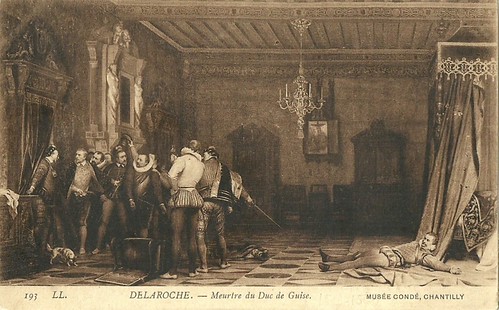
French postcard by Union postale universelle. Early 20th century reproduction of Paul Delaroche's painting 'L'Assassinat du Duc de Guise' (1834) at the Musée Condé, Chantilly. Quoted in the 1908 French silent film L'Assassinat du Duc de Guise by André Calmettes and Charles Le Bargy.
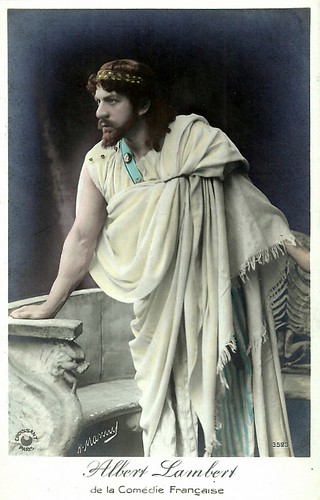
French postcard by Croissant, Paris, no. 3523. Photo: H. Manuel [?]. Albert Lambert as Orestes.
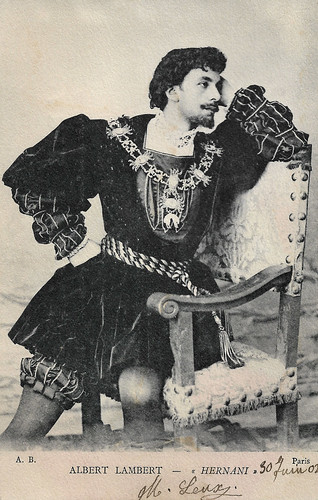
French postcard by A.B. Photo: publicity still for a stage production of 'Hernani' by Victor Hugo. Sent by mail in 1902.
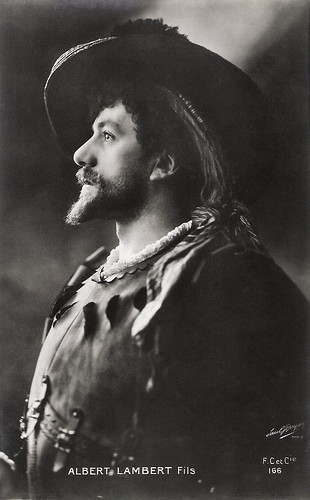
French postcard by F.C. et Cie, no. 166. Photo: Paul Boyer, Paris. Albert Lambert as Hernani.

French postcard. Photo: Couture, Studio Lux. Albert Lambert, Sociétaire de la Comédie-Française.
Charles Pathé
The reception of L'Assassinat du Duc de Guise/The Assassination of the Duke de Guise, which premiered on 17 November 1908 in Paris, was so favourable, that the newly founded film company Le Film d’Art was backed by film magnate Charles Pathé to produce a whole range of such Film d’Art films, though not all had the same success.
Lambert thus acted as Antinous opposite Paul Mounet as Ulysses and Julia Bartet (other sources erroneously indicate Régina Badet) as Penelope in Le retour d’Ulysse (André Calmettes, Charles Le Bargy, 1909), and as Christ opposite Jean Mounet-Sully as Judas in Le baiser de Judas (Armand Bour, André Calmettes, 1909).
After that followed parts in Pygmalion (Daniel Riche, 1910), Oedipe roi (André Calmettes, 1910) after Sophocles and with Mounet-Sully and Berthe Bovy co-acting, Aux temps des premiers chrétiens (André Calmettes, 1910) a liberal adaptation of Sienkiewicz’s 'Quo vadis?' with Lambert as Marcus Vinicius, and Roi d’un jour (André Calmettes, 1910) on the revolution of Masaniello (Lambert) in 17th century Naples against the Duke of Argos (Henri Étievant). IMDb also mentions Moderne Galathée (Georges Denola, 1911) and Chaines rompues (Henri Pouctal, 1912).
Lambert’s film career was short, but his Duc de Guise became film history. While not in Paris, Albert Lambert lived in La Bouille, near Rouen, where he had an eclectic, Neo-Gothic mansion, Le Nids, bought and restyled by his father in 1892.
Albert Lambert was married five times, e.g. to Odette-Jeanne Lévi, with whom he had a daughter Jacqueline Van Tieghem. Lambert died in 1941 in Paris at the age of 76 years.
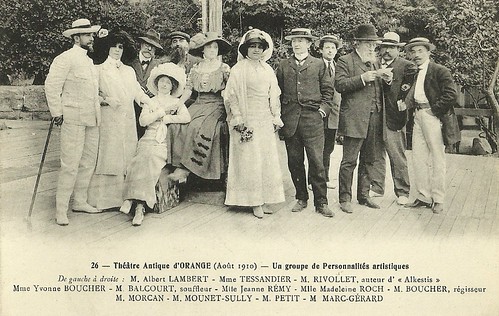
French postcard, no. 26. Théâtre Antique d'Orange, August 1910. Group of artistic personalities. Left to right: Albert Lambert, Aimée Tessandier, Georges Rivollet (auteur of Alkestis, 1899), Yvonne Boucher, Balcourt (souffleur), Jeanne Rémy, Madeleine Roch, Boucher (director), Morcan, Jean Mounet-Sully, Petit, Marc Gérard. 'Alkestis' by Euripides was reworked by Rivollet. Lambert had played the lead of Herakles in 'Alkestis' already in 1900 in Paris, while Paul Mounet, Mounet-Sully's elder brother had played it at its premiere in 1899 at the Theatre d'Orange.
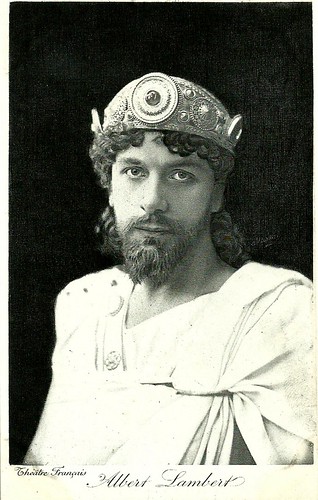
French postcard. Photo: Taille-Douce.
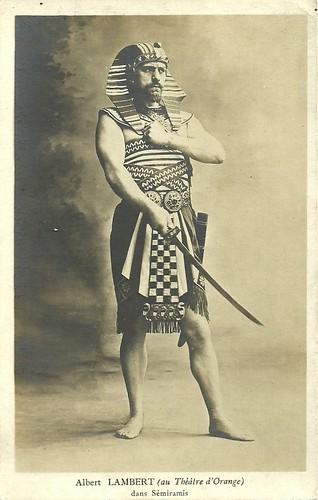
French postcard. Albert Lambert as the Egyptian prince Keth-Aour in the play 'Sémiramis' by Josephin Peladan at the Théâtre Antique d'Orange.
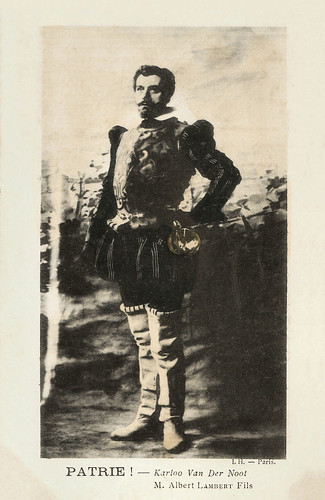
French postcard. Photo: L.H., Paris. Publicity still for the stage production of 'Patrie!' by Victorien Sardou, performed in Paris in 1901 at the Comédie Française, with Albert Lambert Fils as Karloo Van Der Noot.

French postcard. Albert Lambert fils as Karloo Van Der Noot in the play 'Patrie!' (1869) by Victorien Sardou, performed in Paris in 1901 at the Comédie Française.
Sources: Wikipedia (French), IMDb, Filmographie Fondation Jerome Seydoux Pathe, 1895 Revues, Mounet Sully et Paul Mounet.
This post was last updated on 15 May 2022.
No comments:
Post a Comment